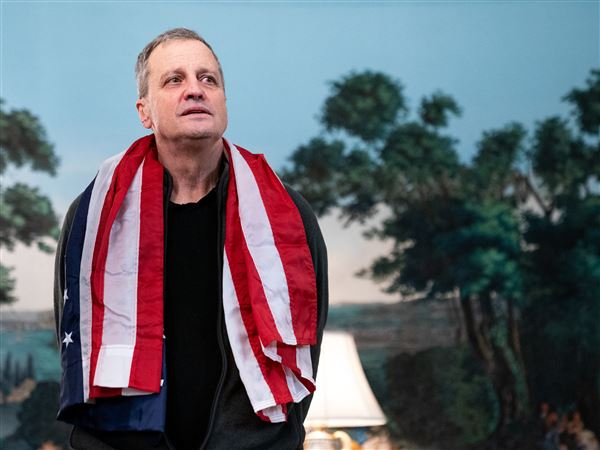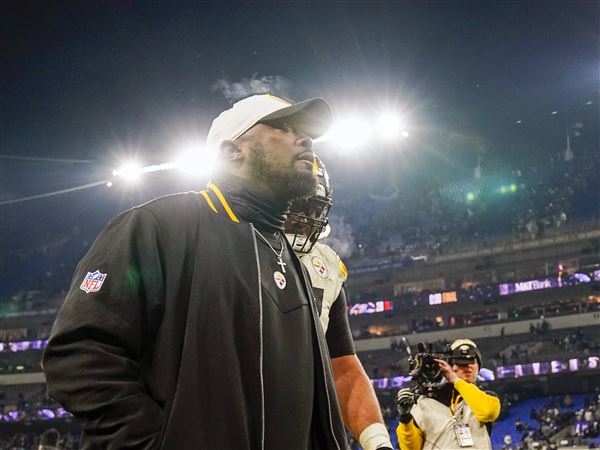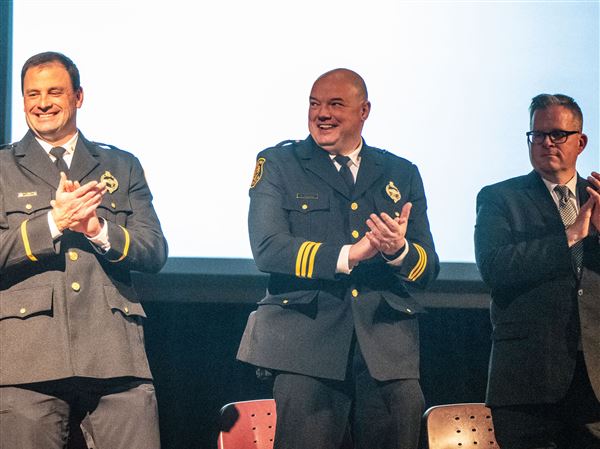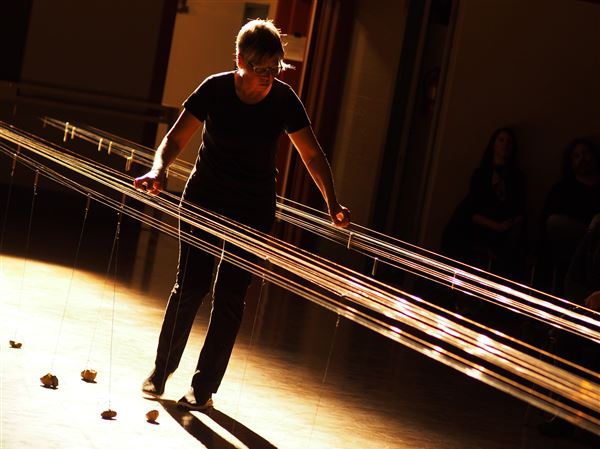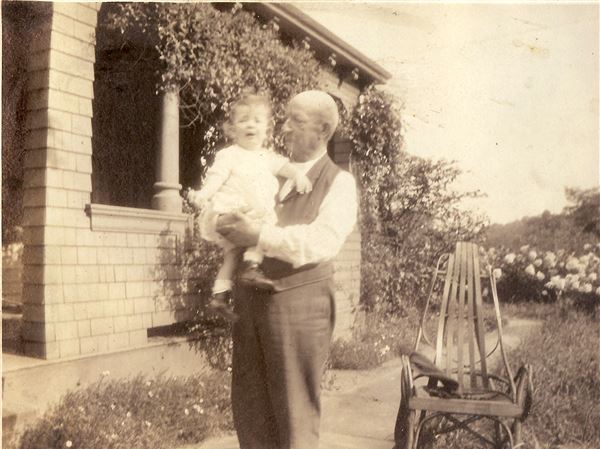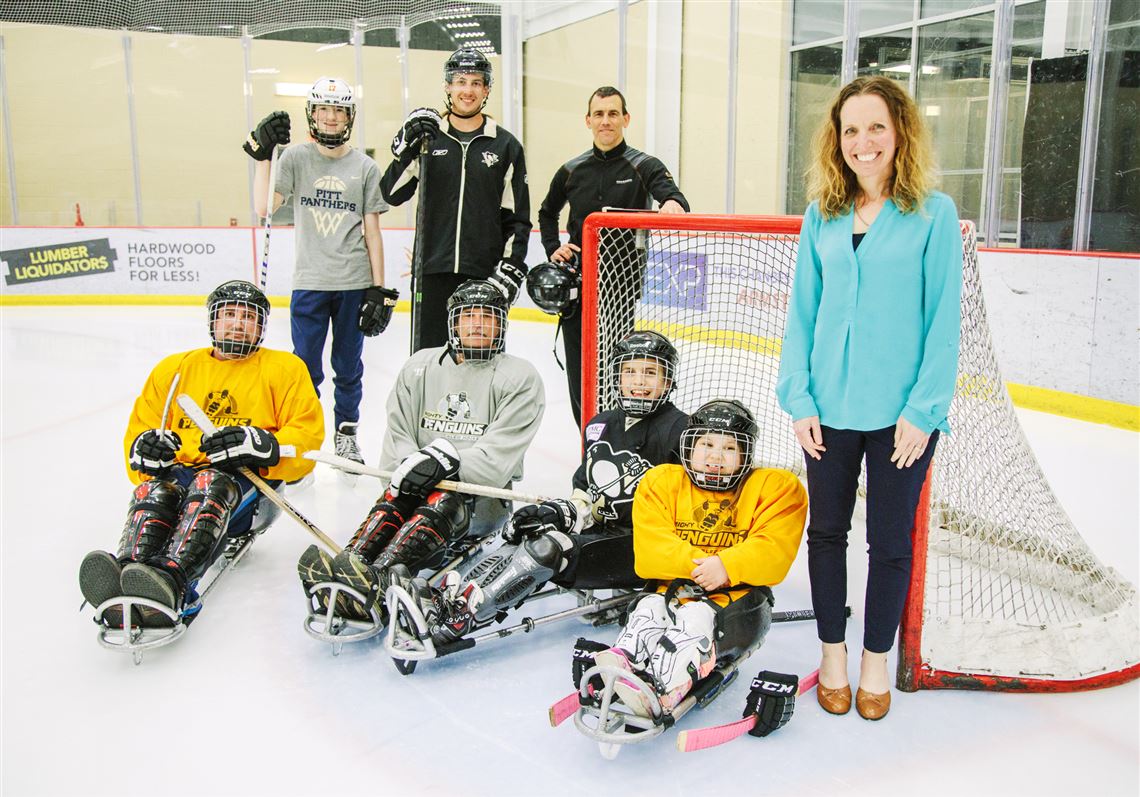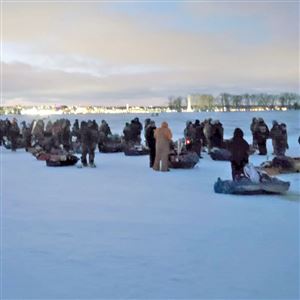Seven-year-old Abigale Gelston was born with spina bifida and can’t move her legs, so she moves around in a wheelchair on land.
But you should see her on the ice.
“Love you, babe!” her mom, Renee, called out as her dad, Scott, finished strapping her into a low sled and slid her out onto the rink at UPMC Lemieux Sports Complex in Cranberry. It was Abby’s second time out, her mom explained. “Look at her go!”
Using her arms to push against the ice with the spiked ends of two short hockey sticks, Abby glided around during warmups for the Saturday practice of Pittsburgh Mighty Penguins Sled Hockey. The group runs therapeutic and competitive ice hockey programs for people with physical disabilities in Pennsylvania and beyond, to help them not just physically but also mentally and socially.
It takes a lot of people to do so. People such as new executive director Amy Brown, who greeted everyone and helped them get the right gear from the equipment room, where her dad, Jay Roach, took down the sleds hanging on a long rack and handed out helmets and shoulder pads and gloves. People such as her husband, Eric Brown, who was busy leading fellow coaches and other volunteers teaching and helping players, one of whom needed to be pushed in his sled.
“There has to be a cohort of people,” said sled hockey dad Kyle Burgess, whose son, Harrison — also born with spina bifida 15 years ago — is one of the standouts of the program’s competitive side. You should see Harrison fire the puck top shelf. You might someday see him in the Paralympic Games.
For all the good that they do for kids through adult athletes, Mr. Burgess nominated the Mighty Penguins board, coaches and managers for the Jefferson Award for Public Service Team Award, which was established to recognize joint volunteer contributions. The award, first given in 2011, is part of the annual Jefferson program that recognizes super volunteers in the region.
The program is administered by the Pittsburgh Post-Gazette with sponsorships from Highmark and BNY Mellon.
Mr. Burgess, past president of the Mighty Penguins, wrote that its leadership team “represents the very best of everyday, ordinary Pittsburghers who work hard for, and treat, all players as if they were a family member of their own.”
They will be honored, along with 25 individual Jefferson Award winners, at a by-invitation award ceremony Thursday at the Heinz History Center.
Ms. Brown hopes it helps the group become even better known so it can serve more people, even if that means they’ll need more volunteers to come, too.
“It’s hard to get the consistency,” she said as she and her husband bustled around with other parents on this recent Saturday at what, except for the specialized gear, felt and sounded like any big hockey practice. Their son, Alex, was a 4-year-old Penguins fan taking skating lessons when he had a sudden and rare spinal cord injury that left him unable to stand. But thanks to having learned about sled hockey, the athletic 11-year-old is on blades a lot and loving it.
That’s how sled hockey came to be, back in the 1960s in Sweden, when some patients at a rehab center wanted to get back on the ice. The sport was introduced to Pittsburgh by volunteers from Erie’s Shriner’s Hospital for Pittsburgh in 1998, which was the start of the Mighty Penguins.
It’s grown to having nearly 60 players at four levels, from novice and junior to intermediate and senior, who practice and play at the Penguins Rinks in Cranberry, to which the program moved from Harmarville when the Lemieux Sports Complex opened last year. The rink has literally slick sled-accessible benches with boards that sled-seated players can see through while they await their shifts in games that are played by the same USA Hockey rules as everyone else. Having such nice and busy home ice also has helped raise the group’s profile.
Mighty Penguins has gotten a lot of press through one of its stars, Dan McCoy, who won the gold medal at the 2014 Paralympic Winter Games in Sochi, Russia, with the USA National Men’s Team. In fact, Mr. Gelston, of Munhall, said he happened to learn about sled hockey for his daughter through a chance meeting with Mr. McCoy’s parents at a Pens game. (Mr. McCoy missed this Saturday practice because he was graduating from the University of Pittsburgh.)
But Ms. Brown knows there are many more people the Mighty Pens can serve, including veterans. “It’s such a broad mix that could join. It’s hard to communicate to all those populations.”
Her predecessor as executive director, Michele Humphreys, is in fact launching a new nonprofit to coordinate fundraising and more for the Mighty Pens and several special hockey programs, including one based in Slippery Rock for blind people. That effort, called Hockey Sticks Together, is to officially launch later this summer and should considerably help raise awareness of special hockey.
In the meantime, with the help of the Pittsburgh Penguins Foundation and UPMC Rehab Institute and other partners, the current Mighty Penguins board (including Maureen Kunitz, the wife of the group’s NHL ambassador Chris Kunitz) works hard to recruit volunteers and raise funds and to have fun. Their big event will be the second Sled Face-off Tournament featuring sled hockey teams from around the country on Columbus Day weekend in October. But they’re always happy for people to come check them out, ask questions and even try the sport.
Mighty Pens leaders will tell you that their sit-down teams love to invite stand-up teams to scrimmage. Those hockey players quickly learn how much upper-body strength it takes to move those sleds and, perhaps, learn a little more.
As Ms. Brown adds with a smile, “We always beat them.”
Bob Batz Jr.: bbatz@post-gazette.com, 412-263-1930 and on Twitter @bobbatzjr.
First Published: May 7, 2017, 4:00 a.m.
